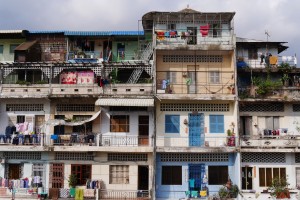BELDA is to develop a common database of energy consumption in the building sector in the Asian countries, creates scenarios with use of quantitative numerical modeling, provides web-based platform which can evaluate effects of measures and policies following the stage of development, and develop international networks among scholars with enhanced use of the platform. This platform can enhance international cooperation between Japan and other Asian countries. BELDA is composed with two sub-schemes.
1.Collection and analysis of energy demand structure of the building sector
With targeting Vietnam, Thailand and Cambodia as research fields, BELDA will implement field survey on monthly energy consumption of the residential sector. Also, BELDA will implement measurement survey of housing and major home appliances in order to obtain data of electric consumption load curve. These surveys will be collaborated with local universities and research institutes that BELDA constructed close relationships. Major information that are collected by the surveys are amount of energy and quality of life.
“Amount of energy” is mainly about electric consumption based on (1) the types of energy such as electricity, gas and fuelwood, (2) Energy consumption of each home appliances, (3) Energy consumption by time of use. These data will collected by both interview survey and measurement survey.
“Quality of life” will be estimated with housing characteristics (gross floor area and duration of stay at home), environmental adaptation behavior (air circulation, transformation with seeking for comfort, bricolage activities) Ownership and utilization of home Appliances and Electronics (TV, PC, AC, Fan, refrigerator etc), thermal environment and comfort. These categories will be investigated by interview survey and measurement survey. For the residential sector, BELDA create a database based on the collected data in urban and rural area, so that BELDA can provide the data base with based on the different level of socio-economic conditions.
Also, in the building sector, a primary study for commercial buildings will be implemented in Thailand and Vietnam, and create a database. These data will be fundamental information of scenario development, policy implementation and examination of suggested policies for the mitigation of carbon dioxide emission in the building sector. In addition, the targeted residences and commercial buildings in the surveys will be the targets for cohort analysis in order to implement surveys with continues time scale.
- Field survey on monthly energy consumption of the residential sector
- Measurement survey of housing and major home appliances in order to obtain data of electric consumption load curve
- Interview survey on people’s tendency of living environment, environmental adaptation behavior, prevalence of home appliances and comfortable thermal environment and feeling
- Field survey on energy consumption of commercial buildings
- Information sharing and implementation of cohort study for policy analysis
2.Development of the platform and promotion activities for enhanced use of the platform
Based on the database that BELDA provides, quantitative numerical modeling will be developed for scenario development of future energy consumption. This scenario includes future socio-economic environment in different countries. The web-based platform provides future trend of the emission of carbon dioxide at the different level of development, and also provides different measures for policy making. International networks among scholars can effectively use of this platform. At the final stage of this project, joint policy recommendations will be provided for reduction of carbon dioxide emissions based on the international networks.
- Specification of definitions and rule-setting toward joint utilization of the platform
- Development of quantitative numerical modeling to forecast future energy demand
- Provision of International academic network and information sharing
- Building web-based database and the platform
- Suggestion of Joint proposals toward the measures of national CO2 emission reduction through international academic network

